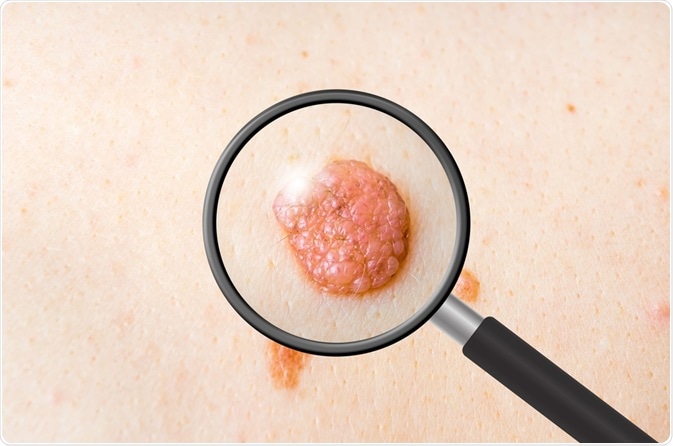Dermatofibrosarcoma protuberans (DFSP), a very rare tumor that arises in the skin, has significant local invasive potential and tends to recur locally after surgical treatment. Metastasis occurs in only about 5 percent of cases.
DFSP occurs in only 1 in 100,000 to 1 million individuals. Black individuals have almost twice the risk as white individuals, but the incidence is increasing in the latter group, with the highest increase being observed among white people who live in Hawaii. Women have a slightly higher risk than men, and the tumor shows an increased rate of growth during pregnancy.
 Image Credit: andriano.cz / Shutterstock.com
Image Credit: andriano.cz / Shutterstock.com
The most common site for DFSP is on the torso, where almost two out of every three occur. Most of the rest are found on the extremities, and a few occur on the head and/or neck, including the scalp and the mucous membrane of the mouth.
Most of these tumors (90%) are associated with a constitutive activation of the PDGFB receptor due to a translocation between chromosomes 17 and 22 t(17;22). Parts of the COL1A1 and PDGFB genes are removed from these two chromosomes and fuse to form a new circular supernumerary chromosome. The effect is to produce unregulated ligand expression, the ligand being platelet-derived growth factor B, which encourages cell proliferation and differentiation into tumor cells.
The tumor begins in most cases as a patch of slightly abnormal skin, usually flat, but sometimes raised, and rarely depressed. The most typical lesion size lies between 1 to 5 cm, but it may extend up to 25 cm. The tumor is reddish, purplish or flesh-colored. It may remain static for months or years, but eventually enlarges, and additional tumors may appear in the vicinity of the tumor. When the tumor grows, the overlying skin stretches may ulcerate or bleed and may be tender or painful.
In neonatal life, the tumor may be mistaken for a birthmark or hemangioma.
Variants of Dermatofibrosarcoma protuberans
These include the following:
- Bednar tumors or pigmented Dermatofibrosarcoma protuberans with melanin-rich dendritic cells
- Myxoid DFSP, which has areas of myxoid degeneration in the stroma
- Giant cell fibroblastoma that contain giant cells, and is also known as juvenile DFSP. This type is characteristically seen in children and adolescents
- Atrophic DFSP is characterized by a depressed area of firm skin in which the epithelium is very close to the subcutaneous tissue
- Sclerosing DFSP is a variant in which the cellularity is low, and the tumor is comprised of uniform bundles of collagen interspersed by more typical DFSP cells
- Granular cell variant is a rare type in which spindle cells are mingled with richly granular cells, the granules being lysosomal, with prominent nucleoli
- Fibrosarcomatous DFSP, which is characterized by regions of aggressive fibrosarcomatous transformation, and are more likely to spread beyond the local area. They account for about 16% of all DFSP tumors.
DFSP (Dermatofibrosarcoma Protuberans): 5-Minute Pathology Pearls
Histology of Dermatofibrosarcoma protuberans
Histologically, the tumor is of the spindle cell type, with densely arranged spindle-shaped cells of uniform size and shape. These originate from dermal cells. They are arranged into bundles, which are irregularly connected to form a storiform or cartwheel array. The number of mitoses is few and nuclei are uniform. Again, the tissue is strongly CD34 positive.
On the other hand, fibrosarcomatous DFSP has areas, which are highly cellular and show prominent mitotic activity, and these cells are in a herringbone pattern arranged into fascicles or bundles. They closely resemble high-grade fibrosarcomatous cells. They are aggressive and infiltration of neighboring structures is very common. Such areas show a loss of CD34 positivity.
References
Further Reading
Last Updated: Feb 11, 2021